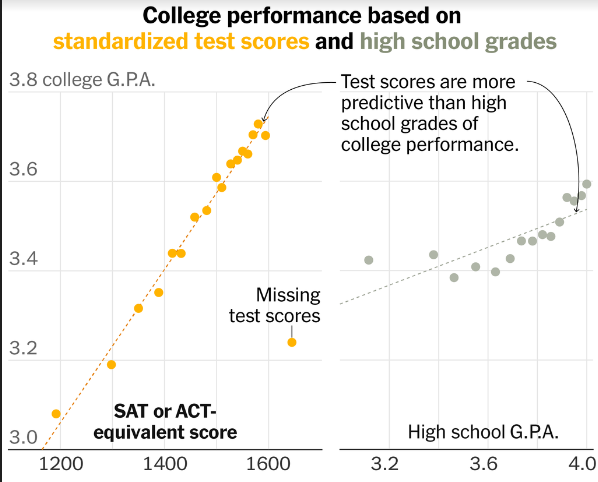
Recent decisions from Dartmouth University and Yale University to reinstate mandatory testing for the Class of 2025 have again raised the debate around the relevancy of standardized testing. During the COVID-19 pandemic admissions cycles, most colleges became test-optional in an attempt to make admissions more equitable. This, however, removed an important aspect of measuring college readiness: a nationwide quantitative measurement of academic achievement.
Despite the flaws of standardized testing, it is necessary alongside qualitative measures, such as extracurriculars and essays, to ensure that students admitted to college are prepared. It can furthermore be a tool for colleges to increase diversity in a post-affirmative action world.
Without test scores, colleges have only one quantitative measure to determine college readiness: GPA. Recent studies by Brown University, Dartmouth College and Harvard College, however, show that ACT and SAT scores are much better indicators of college performance than high school GPA, which depends on myriad factors, including homework and participation. In college, tests and essays make up a much larger percentage of grades, so students need to be able to synthesize and output information effectively, which the SAT measures for.
Relying solely on GPA furthermore makes it difficult to compare students whose schools use different weighted systems. Ms. Chloe Sigillito, Interim Schawbel Center Director and former college admissions officer, who leads the Junior Forum classes says, “We always considered students within the context of their own high school — not across high schools.”
Though this is true, it is impossible to balance hundreds of different systems to make a perfectly accurate comparison, which is why having a standard metric is crucial. Kaitlyn Ho-Tran (I) notes, “The SAT or the ACT does help to standardize everything to put you [in] better […] context of other applicants.”
Despite common misconceptions, standardized testing can actually be used to increase economic and racial diversity in higher education. Since affirmative action has been removed, schools cannot consider race in their admissions processes, but they can admit disadvantaged students — mostly lower income students, of which a large percentage are Black and Latinx — at higher rates than high-income students with the same SAT scores. Dartmouth University uses this policy and has found that lower-income students who were denied admission and had not submitted test scores would have been admitted had they included them.
Furthermore, test-optional policies have not substantially increased schools’ diversity. A 2021 study by American Educational Research found that “test-optional admissions increased the share of Black, Latino and Native American students by only one percentage point at about 100 colleges and universities that adopted the policy between 2005-2006 and 2015-2016.” Abrianna Dumel (II) comments, “If you look at the demographics now, it’s clear that getting rid of standardized testing hasn’t helped with diversity.”
Those against standardized testing argue that it is prejudiced and favors white, higher-income students. While this is true, even without mandatory standardized testing, higher-income students still have the resources and opportunities to make their application stronger through extracurricular activities, college consulting and essay coaching.
Standardized testing will positively impact BLS students by bringing a measure of certainty to the college process. Test scores are one of the only things that students can feel confident in to increase their chances of being admitted, and there are resources readily available to improve.
The decision will also discourage students, who, in order to build strong resumes in the absence of testing, participate in an excessive number of clubs. This can lead to unhealthy sleep habits and flaky participation, which often generates strife between friends and prevents older students from fostering community in their clubs.
Anti-testing advocates argue that people using ideas of equity to push testing are just doing this to make their argument more palatable and do not actually want a more equitable educational system. Dumel comments on this, saying, “[We need to ask] ‘Who wants this? What socioeconomic status [are] they from?’ If it’s really only high-income people who want standardized testing, they’re not going to be the most reliable for helping [disadvantaged students] out […] even if standardized testing would be helpful for them.” Even with that, Dumel agrees with colleges’ decisions, stating, “Data is more reliable from a purely logical stance.”
So, while intent matters, regular citizens need to ensure policymakers continue to pursue more equitable outcomes — abolishing legacy admissions, for example — and data must be the first metric to inform admissions policies. Standardized testing ensures that this will happen.







